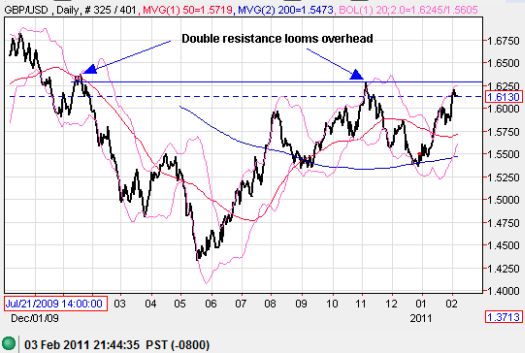After scanning through the latest quarterly release of the “Statement of Monetary Policy” from the Reserve Bank of Australia, I was reminded that currency traders are trying to prepare for eventual rate hikes from the European Central Bank (ECB) and the Bank of England (BoE):
“While financial markets continue to expect the US federal funds rate target to remain unchanged through 2011, expectations of initial monetary policy tightening in the euro area and United Kingdom have been brought forward to around mid 2011, in part due to a less benign outlook for inflation.”
The Bank of England noted in its January meeting that “over the month as a whole, expectations of the point at which Bank Rate would begin to rise had been brought forward. Information derived from overnight index swaps indicated that market participants expected that Bank Rate would increase by 25 basis points by around August. By contrast, longer-term interest rates in the United Kingdom were little changed, having increased in the month leading up to the previous MPC meeting.”
As a result, the euro and the British pound have floated stubbornly higher against the U.S. dollar for almost a month or so. Thanks largely to the market’s disappointment with the lack of hawkish talk from the ECB at its latest rate announcement, the U.S. dollar successfully bounced off critical support as expected. While the euro lost over 1% on the day, the British pound barely budged, and it still looks poised for a break out to fresh two-year highs against the dollar.

Source: dailyfx.com charts
The last bout of weakness for the pound came after fourth quarter GDP numbers printed well below expectations last week. The dip proved temporary as the pound refused to go any lower from there. On Tuesday and Wednesday, Purchasing Manager numbers printed well above expectations (manufacturing activity has not grown this fast in 19 years), renewing expectations (hopes) that the Bank of England will finally be forced to raise interest rates sooner than later. A breakout feels imminent, but if it happens, I am skeptical it will last long.
I believe the BoE remains quite nervous about the sustainability of the economic recovery in the U.K. and will need to see a very convincing GDP number for this first quarter before it even hints it is considering a rate hike. In its last meeting, the BoE’s Monetary Policy Committee (MPC) discussed inflation risks at length, including the many surprises from employment growth and commodity prices, but it also acknowledged the threats to economic recovery.
“…there remained significant downside threats to UK growth. Those stemmed primarily from: the risk of a sustained rise in the household saving rate, possibly in response to the UK fiscal consolidation; the possible impact on the United Kingdom and the international banking system of an intensification of sovereign debt concerns within the euro area; and the continuing funding challenge for UK banks.”
In the end, the MPC was essentially all over the place with the latest decision. The MPC voted 6-3 in favor of leaving rates and the asset purchase program as-is. Adam Posen wanted to increase the asset purchase program. So, it seems to me that although “for most members, recent developments implied that the risks to inflation in the medium term had probably shifted upwards,” it still looks like it will be difficult for the BoE to move to a hawkish stance. This month’s Inflation Report on February 16th will be a real market mover if the BoE finally concludes that inflation pressures are getting too strong to ignore. I will be watching closely, and I expect the pound will not gain much further ground against the U.S. dollar until the release of that report.
Be careful out there!
Full disclosure: net short the pound, “slightly” net short the euro, long FXA
